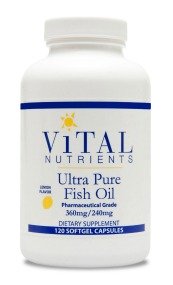How Fish Oil Aids a Successful Pregnancy
We have several dozen favorable research reports on file about the consumption of fish or fish oil. Some of these reports suggest that the oils from fish may improve pregnancy outcomes.
This is an especially important issue for any women with PCOS because of the higher risk of an unfavorable outcome.
Free PCOS Newsletter
Not only are women with PCOS more likely to have a miscarriage, they are also more likely to have complications such as gestational diabetes, pregnancy-induced high blood pressure, pre-eclampsia, or a preterm birth. Their babies are also more likely to end up in intensive care or possibly die.
Fortunately, there are things you can do to improve your odds. Of course, what you eat greatly influences how your pregnancy will turn out.
One of the items in your diet is fish. A recent study of 8,729 Danish women showed that those who ate no fish had a 19-fold increased risk of preterm delivery compared to those women who regularly ate fish. In other words, fish consumption drastically reduced the risk of a preterm birth.
The Danish study was supported by another study of 2,398 pregnant women in Brittany, France. In this study, fish consumption as associated with increased length of gestation.
However, the researchers drew an interesting distinction between fish and shellfish. While fish consumption reduced the risk of preterm birth, shellfish consumption resulted in reduced fetal growth. It appears that eating shellfish on a regular basis may contribute to having a smaller baby.
OK, eating fish and avoiding shellfish while pregnant sounds like a good idea. But what about the mercury and all those other pollutants found in fish?
The sad fact is that our entire food supply is polluted. Nothing is pure and pristine anymore. So what you can do is try to minimize your exposure to pollutants while your future baby is developing. Wild fish from cold waters are a better choice than farm-raised fish. Chapter 8.2 of The Natural Diet Solution for PCOS and Infertility e-book has a list of fish to eat or avoid.
By the way, a recent Spanish study has shown that eating more than one can of tuna per week is associated with lower birth weight. So we suggest you not rely on canned tuna as your main source of fish.
If you want to get most of the benefit of fish without the pollutants, we recommend that you take a high quality supplemental fish oil. Virtually all pollutants and contaminants have been removed from this fish oil. So you get the benefit without the risk.
Supplemental fish oil may be especially appropriate, for two reasons. First, women with PCOS are predisposed to have pregnancy problems. Second, if you are not a fish eater, fish oil supplementation may be especially helpful, according to a new study.
This study, from the Statens Serum Institut in Copenhagen, Denmark, showed that women with previous pregnancy complications were less likely to have a preterm birth when they took supplemental fish oil However, the benefit of the fish oils was confined to those women who consumed little or no fish. So if you don't each fish because it tastes fishy or you're afraid of the pollutants, then supplemental fish oil is suggested.
One final note: If you're concerned about optimizing your chances for a successful outcome, we suggest that you eat a very healthy diet and consider taking a high-quality, comprehensive prenatal nutritional supplement. You need more than just fish oil alone to create a healthy baby.
Related Articles
- How This Oil Helps Polycystic Ovary Syndrome
- Reduces Testosterone
- Fish vs. Flax Oil
- Precautions
- The Fish Oil Solution to PCOS
Sources:
Boomsma CM et al, A meta-analysis of pregnancy outcomes in women with polycystic ovary syndrome, Hum Reprod Update. 2006 Nov-Dec;12(6):673-83
Olsen SF et al, Duration of pregnancy in relation to seafood intake during early and mid pregnancy: prospective cohort, Eur J Epidemiol, 2006; 21(10): 749-58
Guldner L et al, Maternal fish and shellfish intake and pregnancy outcomes: a prospective cohort study in Brittany, France, Environ Health. 2007 Oct 24;6:33
Mendez MA et al, Seafood consumption in pregnancy and infant size at birth: Results from a prospective Spanish cohort, J Epidemiol Community Health. 2009 Aug 25. [Epub ahead of print]
Olsen SF et al, Duration of pregnancy in relation to fish oil supplementation and habitual fish intake: a randomised clinical trial with fish oil, Eur J Clin Nutr. 2007 Aug;61(8):976-85
Get Answers to your Questions about
- Fertility
- Weight Control
- Hair Loss
- Stress
- Unwanted Hair
- Acne...and more!
FREE PCOS Report
and Newsletter

Your email is safe with us. We respect your privacy, and you may unsubscribe at any time.
Recent Articles
-
PCOS Long Journey to The Happy End
Apr 30, 18 07:24 PM
Hi Girls, Maybe my story will have one day a good end but I am not there yet. Until I was 31 years old I lived my dream, having lovely husband, good -
PCOS and Miscarriage
Apr 17, 18 04:03 PM
Proper diet and natural supplements can help the body maintain a pregnancy through successful delivery.
-
How to Deal with PCOS and Stress
Apr 04, 18 04:19 PM
Your body has a natural capacity to heal itself if you provide it with the necessary tools.






